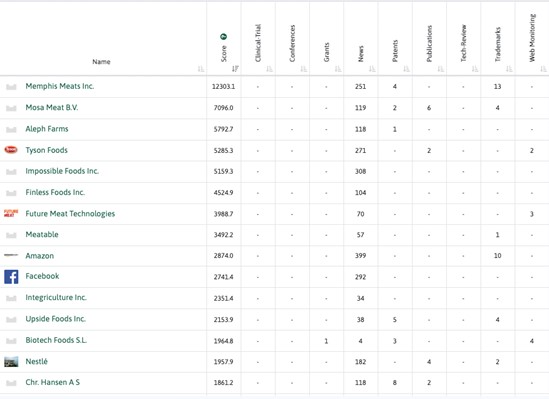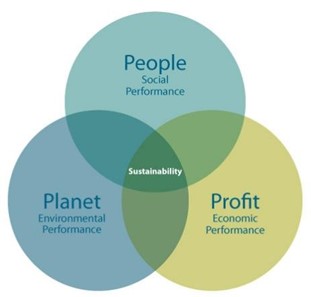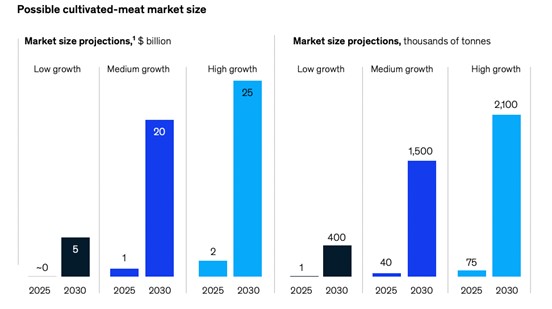From caves to lab

Agriculture and livestock played a key role in our evolution as a society. Moving from hunting to farming meant that humans could settle down in one area and invest their resources in cultural, social and technological developments. It wasn’t a matter of survival it was a matter of wellbeing.
Since we stopped being nomads, evolution has been associated with agriculture and livestock production: the more you produced at a lower price, the better. However, that production rhythm is not sustainable anymore and its environmental impact is very high. Add the increasing awareness of animal welfare and the many quality issues and you get researchers in a lab finding solutions.
By mid-century, the global protein market will look entirely different from now. On one hand, new sources of proteins such as those from plants (pea, canola or chia), mushrooms or insects will have more prominence. On the other hand, the production of meat at an industrial level will be possible without the need of using animals. Cultured meat, in vitro meat, lab-grown meat, cultivated meat or even synthetic meat…
Sounds like a utopia? Let’s see what’s happening:
Sustainable development: our global purpose

Sustainable development must be considered from the perspective of the triple bottom line: social, environmental and economic factors must be considered. Viewed in these terms, cultured meat opens a range of possibilities. We are referring to meat produced by in vitro cell cultures of animal cells.
- Environmental impact: Good Food Institute a life cycle assessment (LCA) and techno-economic assessment (TEA) show that by 2030, cultivated meat could have lower overall environmental impacts, a smaller carbon footprint, and be cost-competitive with some forms of conventional meat. However, other voices as Margaret Mellon, from Union of Concerned Scientists, point to the energy and fossil fuel needs of large-scale in-vitro meat production in a factory. The results offered by our tool Linknovate allow us to find articles analyzing the cultured meat production system in function of its environmental footprint.
- Social impact: the rise of the middle class is a reality. As will be discussed at Food 4 Future, the future of food is a contested space, with multiple competing ideas about how the future will evolve. Cultivated meat appears as an opportunity to democratize access to this protein source, covering a demand that grows every day. Companies as BioTech Foods, work to supply the growing global demand for animal protein, while addressing the main drawbacks of factory farming: health issues, environmental sustainability, and animal welfare.
- Economic impact: the impact of new companies entering the sector is expected to translate into more universal access to meat. Thus, companies like Future Meat Technologies raised record-breaking $347 million in Series B funding, while reducing cost of cultivated chicken to $7.70 per pound. This is already close to what is economically viable and it’s far from the 250,000€ burger (2013).
According to this McKinsey report, and depending on factors such as consumer acceptance and price, the market for cultivated meat could reach $25 billion by 2030.
If cultured meat is a tool to face the 2030 AGENDA, let’s meet the companies that are leading this process:
Companies growing meat in the lab

Using out platform, we can easily discover which companies are leading the progress in manufactured food from alternative raw materials.

ThThese companies stand out for their contribution to the development of cultivated meat
- Future meat: Israeli company claims to be able to produce lab-grown meat at an industrial level. It has achieved the largest round of financing in the laboratory meat sector
- Biobetter: has developed a tobacco-based platform to enable low-cost mass production of the growth factors needed to create meat in a lab.
- Mosa meat: this Dutch Company is worldwide known as been the first one of making a lab hamburger. Having raised $55 million is part of the necessary process to eat their steaks.
- Upside Foods: formerly known as Memphis Meat is one of the most promising cultured meat companies.
- Biotech-Foods: Recently, JBS has invested in the first Spanish cell-based company, which processes are based on tissue growth by in vitro cell culture processes.
- Eat Just: this company is famous for obtaining the approval in Singapore for lab-grown chicken.
As part of the cited McKinsey report, while most start-ups are focusing first on more popular species and breeds, Eat Jest’s GOOD Meat and the company Orbillion Bio are exploring other options such as Wagyu, and the company Vow is working to explore more exotic options, such as kangaroo and alpaca.
A good way to stay updated is to follow https://www.cellularagriculture.eu/, a coalition of food companies that make meat, poultry, seafood, and ingredients that Europeans love with this innovative process known which is also known as cellular agriculture.
LAST HUBS: ETHICS AND BUREAUCRACY
Cultured meat must deal with two additional difficulties for its technological development: ethics and bureaucracy.
On one hand, although governments promote the development of this technology at a strategic level, there are nor many examples of countries that have approved this type of product. Singapore is the only country that has approved its introduction to the market as of 2022. The US Food and Drug Administation (FDA) and the European Food Safety Authority (EFSA) are both working on regulating cultured meat at their own pace. The FDA will probably make advancements sooner as Europe is very reluctant with the use of genetically modified organisms.
On the other hand, if, hypothetically, cultured meat were available in our usual supermarkets, a few issues could be frowned upon. Despite the clear advantages in using lab-grown meat, it is important to note that its name is linked to the use of fetal bovine serum, or blood taken from unborn cow fetuses. Also the by-products generated during the production may be harmful and not as environmentally friendly as expected. And what will happen with livestock farmers when this lab meat starts competing with them? In addition, some people have a reluctance to consume meat that comes from unnatural sources.
In any case, it is a reality that many startups are developing new techniques to solve every issue and this kind of meat will soon be available. Companies like Agrenvec present alternatives for that bio-ethic issue. Using plants (Nicotiana benthamiana), they produce growth factors that may replace animal serum in order to make an alternative which is vegan in every step of the process.
So what would you do? Would you rather eat a hamburger or some cultured meat dumplings?







